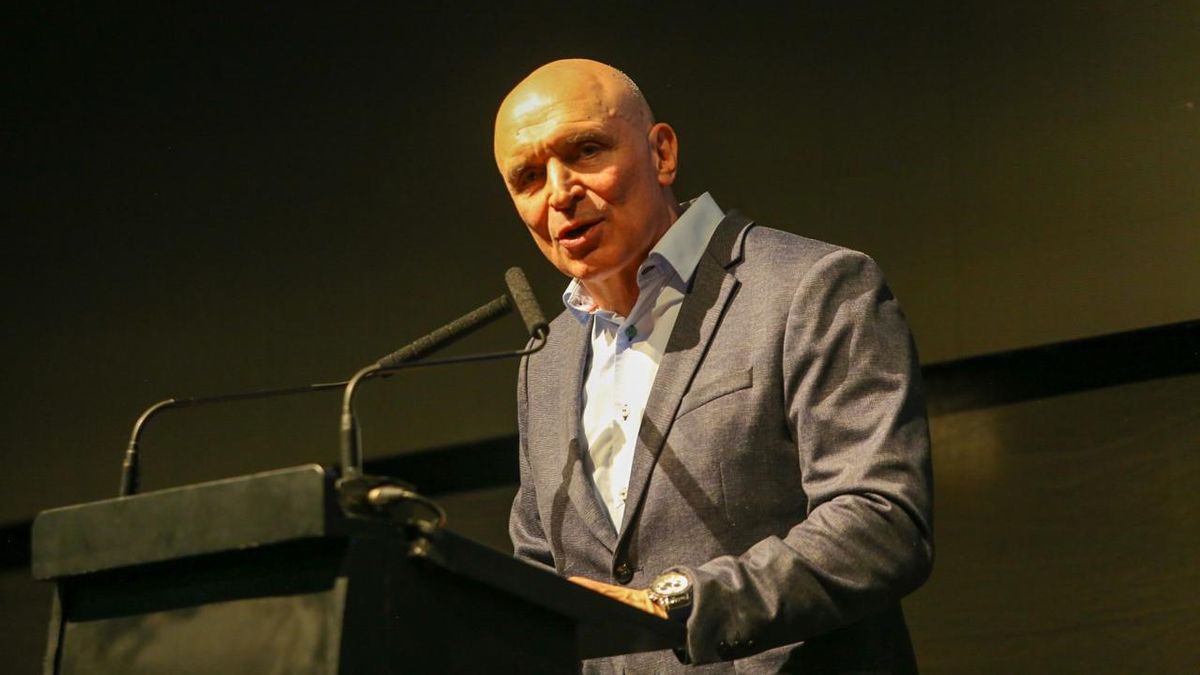Enrique Szewach: It is a ministry quite different from Sturzenegger’s usual activity, this is totally removed from the macro and the day to day. It is known that he was working on a program that would comb through all the laws and regulations that Argentina has. It was precisely the program he had for Patricia Bullrich, who obviously inherited it from Milei. I believe that in all that there is there, there are some very valuable things to put into practice, such as the Law of Hojarascas. It filters out dead laws that are still there but are not applied today, so it is better to remove them to clear the weeds.
Q: Do Sturzenegger’s duties in the Ministry of Deregulation and State Transformation complement or conflict with Caputo’s duties?
IS: I think they complement each other because today we are in a race for Argentina to recover productivity without devaluing. So, in any case, Sturzenegger has the task of creating the environment to improve Argentine productivity and Caputo has the task of keeping it more coordinated while this happens. I am going to exaggerate so that it is understood, it is not for the headline in this way. There are more incompatibilities between Milei and Caputo than between Caputo and Sturzenegger, where I believe there are none.
Q: Why do you see it this way?
IS: I say this because Milei’s economic policy was born with the promise of dollarization and today he continues to insist in some way on this scheme, although he is changing its name: bimonetarism, frozen supply, endogenous dollarization, etc. Meanwhile, Caputo and Bausili are drawing up an orthodox program with the Central Bank trying to defend the peso and stabilize the economy. It seems to me that there is more noise there, and that was noted last Friday.
Q: If this is the case, why is Caputo the one who holds the position of Minister of Economy and not Sturzenegger?
IS: I don’t know if Sturzenegger would have wanted to be there, I really don’t know. I do believe that Milei has an ideological position regarding the economy, but when you are President you have to face reality. It seems to me that Caputo offers him that reality, in terms of not having a program that distances him from dollarization, that he can lay the eventual foundations for dollarization, but he has a much more concrete model for organizing the macro, for stabilizing and above all for rebuilding the entire financial system of Argentina.
Caputo inherited an economy that has a phenomenal internal debt problem, which we are now postponing, and another one with dollars. In other words, it faces a currency problem similar to the one faced by the Macri government when it took office at the end of 2015, with a hollowed-out Central Bank, with US$12 billion in negative net reserves, a failed agreement with the IMF and the need to reopen the capital market because there are already large maturities with bondholders and organizations.
Caputo, at least in his first term, as the President said, was the “Messi of finances” and he managed to reorganize that financial part and I think that Milei must have seen in what Caputo offered him what he does not have, because his mind is more on fiscal adjustment, the “there is no money” on the one hand, and on the immorality of an open Central Bank on the other.
Q: You highlighted the noise generated by Caputo and Bausili’s announcement last Friday afternoon. What stage is the Minister of Economy’s plan at? Is he caught in a trap?
IS: I don’t think there is a trap. First, there is the message, the communication, which is very important in the economy because it creates expectations, in the face of a President who insists on a scheme of repudiation of the peso, and a Minister and a President of the Central Bank who have no choice but to try to restore the demand for money.
Furthermore, we see an International Monetary Fund that is saying “be careful, we are not saying the same thing as Milei” (about currency competition). This is to the point that, every time currency competition appears in an IMF document, it is written in quotation marks.
It was in this context that the communication took place, where Bausili and Caputo made it clear that, despite Argentina having a dollar problem, they will not put emphasis on recovering reserves, but rather prioritize the scheme of lowering the inflation rate.
It may be right or it may be wrong, I am not questioning it, I am simply saying that you have a bond in dollars and the president of the Central Bank on a Friday tells you, “next quarter I am going to lose US$3,000 million in reserves” and the Minister of Economy adds “I am going to maintain the exchange rate system that prevents me from recovering reserves.”
On the other hand, if you have pesos, the president of the Central Bank tells you, “we are going to exchange the Central Bank bill for a Treasury bond, but in reality it will be managed by the Central Bank.”
I am not judging the scheme, but I am pointing out these relatively confusing signals that arise when a President, who is also an economist, says “I want to go in such a direction” and Caputo and Bausili, without saying that they are not going to go in that direction, let’s say, try to smooth the path.
Q: Is there a “gradual” way out of the restrictions in this context or is a shock imposed to avoid the market transition?
IS: The truth is that I am not very clear on why some colleagues have put so much emphasis on this story of the currency controls as a priority for investment and for the recovery of reserves. Investment comes if there is business, and that is not so clear today. I do not see a queue at the BCRA asking for numbers to bring dollars and invest in Argentina. What is more, paradoxically – and I say this with irony – the currency controls were in recent years the main driver of investment in Argentina, because all those who had pesos accumulated in the profits given to them by the Massa Government did not know what to do with them and began to invest so that they would not be diluted.
Back to the topic, for large investments there is the RIGI, and the RIGI lifts the restrictions, meaning that for large sectors there will be no restrictions when they freely use their currencies.
There is no restriction on individuals either, you can buy and sell dollars freely by going to the MEP or the CCL. The most serious problem is for companies that have to operate commercially in Argentina, that is, the restriction on payments for imports, because companies with this issue of paying in installments accumulate debts with their suppliers and parent companies.
That said, it is clear that if you are going to release a certain part of those transactions and you do not have dollars to handle any volatility in the market, well, you run a risk. It seems to me that the Minister and the President of the Central Bank prefer not to run that risk today, even though there are some who say that this risk is very low.
Q: Do you understand that the International Monetary Fund intends to renegotiate an agreement with Argentina that includes new disbursements?
IS: The truth is that, with a government that offers fiscal over-adjustment and is willing to move forward with fundamental reforms, it should not be so strict. Now, having said that, the Fund Staff is not going to give Argentina fresh money with this exchange rate regime, nor with this real exchange rate. Remember that the Fund still has in its DNA the current account problems of countries, not inflation or internal market problems.
The IMF tells you, look, you are using a mechanism that is prohibited by our Statute, which is the application of multiple exchange rates. In addition, you lost at least US$8 billion thanks to the dollar blend, which you could have had in the Central Bank reserves to pay for imports, but you sent them to the free market. In fact, they were used to pay for imports from exporters who went to the CCL. Now you have an exchange rate that is not very bad yet, but when you project it, it is worse, and that is why the IMF demands that you go to another exchange market.
It is also true that the politician then negotiates certain things with the Staff, perhaps there is a bet that the Trump Government will eventually have a different position regarding Argentina or whatever.
The Fund needs an agreement with Argentina because it cannot have its main debtor after this year without an agreement, and Argentina needs an agreement with the Fund, not so much for the fresh funds, which of course would be very good, but because the international capital market must be reopened and it is difficult to do so if you do not have an agreement with the organization, although having one does not guarantee you anything.
Q: Six months into his administration, liberal economists themselves are warning about the high level of emissions that Milei maintains. This is a discussion on social networks to which Caputo joined, calling colleagues who point this out “intellectually dishonest.” Where do you stand in this debate?
IS: The truth is that for professional economists the issue of the money market is whether supply meets demand. If you have an imbalance in the domestic market and more supply than demand, that greater supply will be transferred to the imbalance in the external market and vice versa.
It seems to me that what is confusing is that the demand for money in a stabilization process, if the inflation rate falls, increases by nature, and as the President put so much emphasis on the fact that it was falling, he was diluting the amount of pesos, now that it is diluting (sic), it is left hanging in the air, with all due respect.
Q: One possibility that the government is considering, in the context of its search for improved exchange and monetary policy, is to converge to a dollar running at 2%, an inflation rate of 2% and… an interest rate of 4%? Is this possible?
IS: Any stabilization plan first requires that relative prices be aligned, and that has not yet happened, because tariff increases have been halfway completed and there are still many prices that remain misaligned, including wages.
It seems to me that convergence to a much lower inflation rate than this will not be possible. There are still tariff increases to be made. When you apply tariff increases that add 2% to the index and the index is 20, then it is 10% of the inflation rate. Now, when you make that tariff increase that adds 2% to the index and the index is 4, it is 50% of the inflation rate. So, first the tariffs have to be aligned; it does not seem reasonable to me that they continue to be postponed.
At the same time, there is a contradiction between saying “we must have investments” and having artificial prices, because investment is calculated with real prices, right? So, I think it is possible to maintain disinflation at 4% or 3%, but to go even lower, relative prices are not in order.
Source: Ambito




